Campaign Resources (403 found)
Unhealed Wounds: ကုထုံးမဲ့လူ႔အခြင့္အေရးအနာမ်ား?
ယခု အစီစဥ္ခံစာသည္ ၂၀၁၁-၂၀၁၅ ခုႏွစ္အတြင္း ျမန္မာ့တပ္မေတာ္ ႏွင့္ တုိင္းရင္းသားလက္နက္ကိုင္အဖဲြ႔မ်ား အၾကားျဖစ္ပြားခဲ့ေသာ ပဠိပကၡမ်ားေၾကာင့္ လူ႔အခြင့္အေရးဆုံးရႈံးမႈမ်ားကို ကခ်င္ျပည္နယ္အေျခစိုက္ United Rights Group ( URG) မွ မွတ္တမ္းျပဳစုေရးသားထားျခင္းျဖစ္ပါသည္။ ဤအစီရင္ခံစာသည္ ေျမယာသိမ္းဆည္းမႈ စေသာလူ႔အခြင့္အေရးခ်ိဳးေဖာက္မႈမ်ား ပါ၀င္မႈ မရွိပါ […]
• • •We Used to Fear Bullets Now We Fear Bulldozers. Dirty coal mining by military cronies & Thai companies Ban Chaung, Dawei District, Myanmar
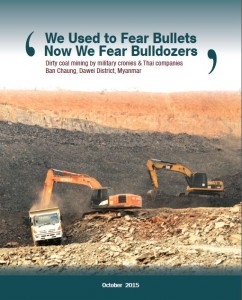 This report was researched and written collaboratively by Dawei Civil Society Organizations and documents the environmental and social impacts of the Ban Chaung coal mining project in Dawei District of Myanmar’s Tanintharyi Region. Based on desk research, interviews with villagers, and direct engagement with companies and government, it exposes how the project was pushed ahead despite clear opposition from the local community […]
This report was researched and written collaboratively by Dawei Civil Society Organizations and documents the environmental and social impacts of the Ban Chaung coal mining project in Dawei District of Myanmar’s Tanintharyi Region. Based on desk research, interviews with villagers, and direct engagement with companies and government, it exposes how the project was pushed ahead despite clear opposition from the local community […]
Burma’s 2015 Elections and the 2008 Constitution
With elections scheduled in Burma on 8 November, this briefing contains detailed analysis of what is likely to happen after election day, the process of the elections, and key election statistics […]
• • •Free Burma Rangers: Update on Burma Army Activity in Kachin State, Burma
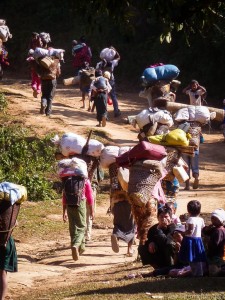 During August/September there has been increased troop activity and clashes between the Burma Army and ethnic resistance groups in Kachin & Northern Shan States. As elections draw near Burma Army troops are heavily reinforcing their positions with supplies and soldiers. Despite ceasefire discussions the Burma Army has refused to halt military operations against Kachin and Shan groups as well as against civilians […]
During August/September there has been increased troop activity and clashes between the Burma Army and ethnic resistance groups in Kachin & Northern Shan States. As elections draw near Burma Army troops are heavily reinforcing their positions with supplies and soldiers. Despite ceasefire discussions the Burma Army has refused to halt military operations against Kachin and Shan groups as well as against civilians […]
PERSECUTION OF THE ROHINGYA MUSLIMS: Is Genocide Occurring in Myanmar’s Rakhine State?
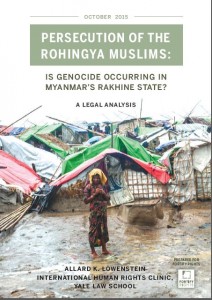 This legal analysis considers whether the ongoing attacks on and persecution of the Rohingya Muslim population in Myanmar constitute genocide, as defined by the 1948 Convention on the Prevention and Punishment of the Crime of Genocide (the Genocide Convention) […]
This legal analysis considers whether the ongoing attacks on and persecution of the Rohingya Muslim population in Myanmar constitute genocide, as defined by the 1948 Convention on the Prevention and Punishment of the Crime of Genocide (the Genocide Convention) […]
COUNTDOWN TO ANNIHILATION: GENOCIDE IN MYANMAR
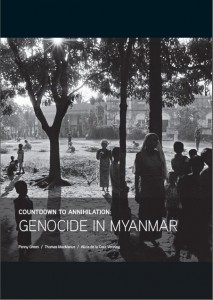 The Rohingya face the final stages of genocide. Decades of persecution have taken on a new and intensified form since mass killings in 2012. The marked escalation in State-sponsored stigmatisation, discrimination, violence and segregation, and the systematic weakening of the community, make precarious the very existence of the Rohingya […]
The Rohingya face the final stages of genocide. Decades of persecution have taken on a new and intensified form since mass killings in 2012. The marked escalation in State-sponsored stigmatisation, discrimination, violence and segregation, and the systematic weakening of the community, make precarious the very existence of the Rohingya […]
Myanmar: Freedom on the Net 2015
Internet freedom in Myanmar declined during the coverage period of this report in comparison with the progress made since the country undertook liberalization in 2011. 1 The government and security forces stepped up intimidation of internet users during social protests, intensifying conflict in ethnic minority regions, and during preparation for the 2015 national elections […]
• • •Promotion and protection of human rights, Situation of human rights in Myanmar
The Secretary-General has the honour to present to the members of the General Assembly the report on the situation of human rights in Myanmar submitted by the Special Rapporteur on the situation of human rights in Myanmar, Yanghee Lee, in accordance with General Assembly resolution 69/248 […]
• • •Comparing States’ treatment of businesses and associations worldwide
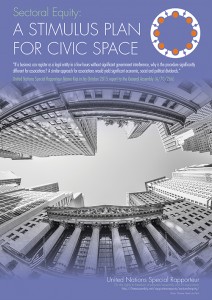 In this report, Maina Kiai’s third to the United Nations General Assembly, the Special Rapporteur compares the enabling environments that States, multilateral organizations and other actors create for businesses and associations, and highlights instances where they are treated inequitably.
In this report, Maina Kiai’s third to the United Nations General Assembly, the Special Rapporteur compares the enabling environments that States, multilateral organizations and other actors create for businesses and associations, and highlights instances where they are treated inequitably.
Submission to the United Nations Universal Periodic Review on Refugees and Displaced Persons Burma/Myanmar
1. This submission focuses on Burma’s compliance with international human rights obligations in relation to Burma’s refugees and displaced persons safe, dignified and voluntary return. It draws on interviews conducted with a mixture of semi-structured individual interviews and focus groups with refugees from Mae La, Umpiem Mai, Ban Nai Soi, and Mae Ra Ma Luang refugee camps including women, youth and religious minority groups, Mon, Karenni, and Karen civil society groups, ethnic armed groups (EAGs), refugee committees, and international non-governmental organizations […]
• • •
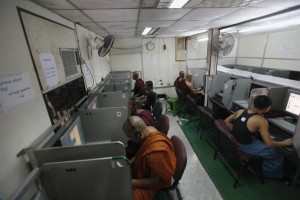
 All posts
All posts